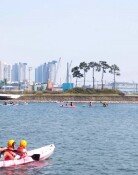Korean independence activist Jang Joon-has stone pillow
Korean independence activist Jang Joon-has stone pillow
Posted August. 17, 2015 07:12,
Jacob, an Israelite patriarch in the Book of Genesis, used a stone as a pillow on the way of fleeing from his elder twin brother who pursued him to kill. In Jacobs dream, God promised to give the land that Jacob was sleeping to him and his descendants. Korean independence activist Jang Joon-ha (1918-1975), who was born and grew from a Christian family, must have had a deep impression on this Biblical story. He likened the stone pillow to the challenges that he suffered from while fighting for independence of Korea in China against Japanese colonial rule. Jang named his memoir on the days of independence movement "Stone Pillow."
Jang escaped the Japanese army in Suzhou, China, to which he was forcibly conscripted as a student soldier in July 1944. After a long journey over 2,340 kilometers, Jang arrived at the Provisional Government of the Republic of Korea in Chongqing, China, six months later. He joined the independence army and participated activities with the Office of Strategic Services (OSS), an American intelligence unit. Kim Joon-yeop, who became later the president of Korea University, was a fellow soldier who received the training together. On a winter night, Jang and Kim hugged each other to survive the cold spell in the snow-covered field and made commitment not to be a shameful ancestor to the descendants. They stayed up all night in the midst of strong wind and snowstorm. But sorrow of the deprived country saddened their hearts.
Lee Kwang-soo, a Korean writer who studied in Japan, associated a stone pillow with leisurely rest. He wrote an essay about a stone pillow that he picked from a stream, which was good to use for a nap. Quoting a phrase about a person using a high stone pillow from an old Chinese poem, Lee wrote that a person looked cool as he slept over a stone pillow with his heavy luggage left aside on a mountain path. Even though Lee was a chief editor of the "Dongnip Shinmun (Independence Newspaper)" under the Koreas Provisional Government in Shanghai, he later changed his mind to support the Japanese Empire. Probably, the meaning of a stone pillow would have been different to Lee from those to independence activists.
After Korea regained independence, Jang exercised great influence in the society of the intellectual by acrimoniously denouncing and criticizing the power as a publisher of a monthly magazine titled "Sasanggye." During the Park Chung-hee administration, Jang was oppressed and persecuted as he opposed and fought against the administration. Today marks the 40th anniversary of his mysterious death, which took place on a trail of the Yaksabong Mountain in Pocheon, Gyeonggi Province on Aug. 17, 1975. The possibility of a homicide was strongly raised but the truth was not revealed. I doubt weather Jang would feel proud of his sufferings from the days he used a stone pillow while sleeping out in the open to fight against the Japanese Emperor, if he sees the current Korean society this year, which marks the 70th anniversary of the liberation.
eligius@donga.com







